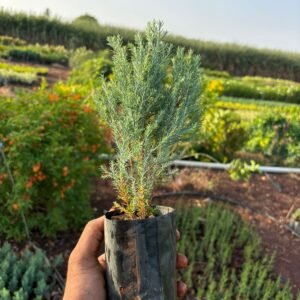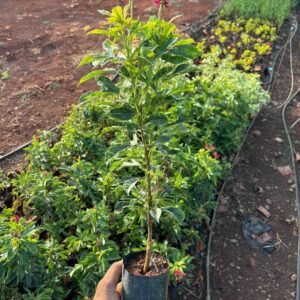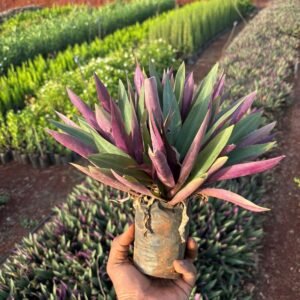The Pimpal plant, known scientifically as Ficus religiosa and often referred to as the Sacred Fig or Bodhi tree, holds a significant place in both horticulture and culture. Revered for its religious and symbolic importance in many Eastern traditions, particularly in Buddhism and Hinduism, the Pimpal tree is also an attractive ornamental plant. When cultivated in smaller garden settings or indoors, the Pimpal can grow to a manageable height of 5 to 6 feet, offering a majestic and serene presence.
Characteristics and Appearance
The Pimpal plant is known for its distinctive, heart-shaped leaves with long, tapering tips. These glossy, bright green leaves flutter gracefully in the breeze, creating a tranquil atmosphere wherever they are grown. The leaves are large, typically measuring 4 to 8 inches in length, and the plant’s overall growth habit is upright and spreading, with strong, graceful branches.
The plant may produce small, round figs that start green and turn purple as they mature, although these are generally more noticeable in larger, outdoor-grown trees. When grown in smaller pots or confined spaces, the Pimpal’s elegant foliage becomes the primary focus of its beauty.
The Pimpal plant is particularly prized for its historical and spiritual associations. It is the tree under which Siddhartha Gautama (the Buddha) is said to have attained enlightenment, further deepening its significance in Eastern spirituality.
Care and Maintenance
The Pimpal plant is relatively hardy and can adapt to a variety of growing conditions, making it suitable for both novice and experienced gardeners. Here’s how to care for it:
- Light: The Pimpal plant thrives in full sunlight. For healthy, vibrant growth, it requires at least 6 hours of direct sunlight daily. When grown indoors, place it near a bright, sunny window or move it outdoors during the day to ensure it gets enough light.
- Watering: This plant prefers regular watering, especially during the growing season (spring and summer). Keep the soil consistently moist but not waterlogged, allowing the top inch of soil to dry between waterings. Reduce watering in the cooler months when the plant’s growth slows.
- Soil: The Pimpal plant grows best in well-draining soil that is rich in organic matter. A mix of garden soil, compost, and sand can provide the ideal growing medium, ensuring proper drainage and nutrient availability.
- Humidity: While the Pimpal plant can tolerate varying humidity levels, moderate humidity is ideal for optimal growth. If growing indoors, mist the plant occasionally, especially in dry environments, to mimic its natural tropical conditions.
- Fertilization: Feed the Pimpal plant with a balanced fertilizer every 4 to 6 weeks during the growing season. This will help encourage lush foliage and robust growth. Fertilizer should be reduced or stopped during the fall and winter months when the plant is dormant.
- Pruning: The Pimpal plant benefits from regular pruning, which helps maintain its shape and encourages denser growth. Remove any dead or yellowing leaves and trim back leggy or overgrown branches to maintain the plant’s aesthetic appeal.
Cultural Significance
The Pimpal tree holds deep cultural and religious significance, particularly in Buddhism, where it is revered as the Bodhi tree—the very tree under which Buddha attained enlightenment. It is also worshipped in Hinduism as a sacred tree associated with Vishnu and fertility, often planted near temples and shrines. In many cultures, the tree is considered a symbol of wisdom, peace, and knowledge.
In modern landscapes, it continues to serve as a symbol of spirituality and serenity. Having a Pimpal plant in the home or garden can imbue the space with a sense of tranquility and connection to nature.
Uses and Benefits
- Ornamental Value: The Pimpal plant’s striking foliage and elegant structure make it a beautiful ornamental addition to homes, offices, or outdoor spaces. Its lush green leaves bring a sense of calm and beauty to any setting.
- Air Purification: Like many Ficus species, the Pimpal plant can help purify indoor air by filtering out pollutants and toxins, improving overall air quality and creating a healthier living environment.
- Medicinal Uses: In traditional Ayurvedic medicine, various parts of the Pimpal tree (leaves, bark, and sap) are used for their medicinal properties. It is believed to have anti-inflammatory, antimicrobial, and wound-healing properties.
- Environmental Benefits: When planted outdoors, the Pimpal tree provides shade and helps prevent soil erosion with its deep root system. Even when grown in pots, its environmental contribution is valuable, as it supports a healthy ecosystem.
Conclusion
In summary, the Pimpal 5×6 plant is much more than just a beautiful addition to a garden or indoor space. Its deep cultural and spiritual significance, coupled with its graceful, heart-shaped leaves and hardy nature, make it a treasured plant among enthusiasts and spiritual seekers alike. Easy to care for and versatile in various environments, the Pimpal plant brings both aesthetic beauty and a sense of peace, wisdom, and connection to nature, making it a beloved choice for homes, temples, and gardens. Whether admired for its symbolism or its lush greenery, the Pimpal plant is a timeless and meaningful addition to any collection.






Reviews
There are no reviews yet.